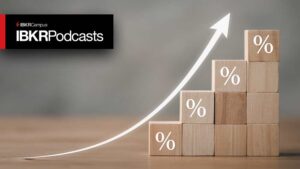Despite evidence of a slowdown in employment growth, a seismic shift in interest rate expectations seems to endorse the likelihood of a July interest rate increase.
Summary – IBKR Podcasts Ep. 91
The following is a summary of a live audio recording and may contain errors in spelling or grammar. Although IBKR has edited for clarity no material changes have been made.
Andrew Wilkinson
Welcome to this week’s Economic Podcast from Interactive Brokers. Joining me to discuss the U.S. economy, we have Head of Electronic Fixed Income Trading, Joe Burke— welcome Joe.
Joe Burke
Hello Andrew.
Andrew Wilkinson
And senior economist José Torres. How are you, José?
José Torres
Hello Andrew, great to be here, doing well.
Andrew Wilkinson
Well, a huge welcome to you both. Once again, we’re between the employment report and inflation data. So, let’s start with José. What are the key takeaways from the June jobs report last week in which the economy added 209,000 jobs, according to the official nonfarm payroll report. And meanwhile, the ADP private payroll report also said something different. What’s your insight?
José Torres
Employment growth is definitely slowing. It’s just not slowing to a degree that’s fast enough for the Fed’s 2% inflation target. In past cycles, we’ve seen that monetary policy tightening has slowed the labor market in a much faster and much more efficient way. But this time around, company balance sheets are really strong. And companies following the experience of the pandemic by having a lot of labor turnover and a lot of retirements led to a much different labor market today. Given those two facts, companies want to make money and want to position for the next economic cycle, so they have been hiring between both BLS and ADP reports. There were a few discrepancies like with trade, transportation, and utilities. Also, with leisure and hospitality— one report, the ADP one, showed a lot more strength than the BLS one. But overall, we look at all indicators together. We do see that the labor market is slowing.
Andrew Wilkinson
So, Joe, let’s talk about the U.S. Treasury market. Treasury prices have sold off during both June and July, which resulted in the 10-year yield jumping up through about 4% as we headed into the weekend following nonfarm payroll. Explain first of all, what caused the selloff in treasuries, the lift in yields. How do you explain the shifting yield curve?
Joe Burke
What started this was the debt ceiling being passed. There was a lot of concern that had the debt ceiling not been passed, the U.S. would go into a very significant recession. Once the debt ceiling was passed and we had some Feds speak— where they talked about additional tightening’s beyond just the one that everyone is expecting—there’s tightening priced in for July and there’s one later in the year. I think the idea is that interest rates are going to be here for a while. They’re going to continue to go higher and they’re not going to come down. So, there’s absolutely no concept right now that the Fed will consider easing before the end of the year. That is definitely a 2024 or beyond type of thing, so when you look at the 10-year back at the beginning of June was at 3.60% now it’s at 4.01%. The two year, which is more influenced by the Fed funds rate than anything else, was at 4.25%. Now it’s at 4.98% and actually got above 5% briefly last week. Starting with the debt ceiling and then the additional Fed speak— a little bit data dependent with the CPI but I think the other factors are more relevant.
Andrew Wilkinson
What in your opinion does that tell us about the prospect of a recession?
Joe Burke
I think, you know, the more the curve flattens, the greater likelihood there will be a recession.
Andrew Wilkinson
José, does the FOMC need to raise rates in July to further combat inflation? And do you think that they have inflation under control?
José Torres
I do think that the Fed will need to increase in July and probably do one more after that. In terms of the yield curve, what I’ve noticed last week was that following the ADP report, both the two- and 10-year yields jumped significantly. But then, when BLS came in on Friday, you actually had some bear steepening going on. You had the two-year come down significantly, but the 10-year actually stay high because of inflation expectations. And both reports show that wages remain sticky and very strong, a lot stronger than a level that’s consistent with 2% inflation. When you look at services, you’re seeing the same kind of growth that’s labor intensive and that’s working its way into prices. On the goods and commodity side, however, things have been easing pretty notably, so the Fed has really won the battle on commodities and on goods. The problem now with services, which happened to be very labor intensive due to the labor market shifts following the pandemic and excess retirements, some mothers staying at home, younger people having trouble matching with the job that they want to work in—that has underpinned wages and I think that the biggest threat moving forward will be those services.
Andrew Wilkinson
Joe, talk a little bit about the development of the interest rate market during the tightening cycle. What is the interest rate market currently responding to most? Is it comments from central bankers? Is it the data, still? Is it global markets, perhaps? What do you think is moving it?
Joe Burke
Well, I don’t think there’s one answer for that. I think it depends on what part of the yield curve you’re talking about. The short end of the curve is highly sensitive to Fed policy, so Fed comments, interest rate policy in terms of, you know, expectations of increasing interest rates. The Fed funds rate specifically— that’s what’s going to really create the short end of the curve. The longer end of the curve, 10-years or so, is really based upon inflationary expectations. And to José’s point earlier, as the two-year sort of wobbled around a little bit around the 5% level, 10 years got across 4% and sort of stayed there. So, there is a bit of stickiness and the expectation that inflation is here to stay.
Andrew Wilkinson
José Torres economist for Interactive Brokers group down in West Palm Beach and Joe Burke, head of Electronic Fixed Income Trading here in Greenwich, CT, thank you both very much, and folks don’t forget to give us a rating wherever you download your podcasts from. Check us out at IBKRpodcast.com for this and all other earlier podcast recordings. Thanks guys!
Joe Burke
Thank you.
José Torres
Thank you.
Disclosure: Interactive Brokers
The analysis in this material is provided for information only and is not and should not be construed as an offer to sell or the solicitation of an offer to buy any security. To the extent that this material discusses general market activity, industry or sector trends or other broad-based economic or political conditions, it should not be construed as research or investment advice. To the extent that it includes references to specific securities, commodities, currencies, or other instruments, those references do not constitute a recommendation by IBKR to buy, sell or hold such investments. This material does not and is not intended to take into account the particular financial conditions, investment objectives or requirements of individual customers. Before acting on this material, you should consider whether it is suitable for your particular circumstances and, as necessary, seek professional advice.
The views and opinions expressed herein are those of the author and do not necessarily reflect the views of Interactive Brokers, its affiliates, or its employees.


















Join The Conversation
If you have a general question, it may already be covered in our FAQs. If you have an account-specific question or concern, please reach out to Client Services.